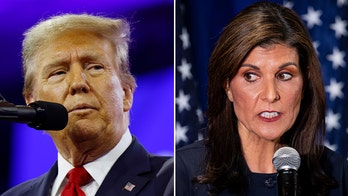
AP Photo
While Senate Democratic leaders say they do not want another two-week or similar short-term government funding measure, and with Republicans taunting Democrats to show them a plan of their own to avert a shutdown, senior Congressional aides on both sides of the aisle concede a temporary stop-gap bill is all but certain to be what's approved next, a product that closely resembles what was passed in the Senate earlier Wednesday.
Where will they find another approximately $4 billion?
According to a senior Senate Democratic leadership aide, there is only about $2.5 billion left in the unused pot of earmarked projects ($2.7 billion was used in the first measure, part of the $4 billion total), so they can use that and the remainder from the $24.7 billion in rescissions the president proposed in his 2012 budget (they would speed those up).
But getting all sides to the negotiating table is proving a bit awkward.
Besides the pointed barbs from both sides, the White House, according to Senate Democratic leaders, extended an invitation that Republicans say they never received. The Administration sent an e-mail to the press with President Obama "calling on Democratic and Republican leaders of Congress to begin meeting immediately with the Vice President, my Chief of Staff, and Budget Director so we can find common ground on a budget that makes sure we are living within our means."
But that was the first Republicans heard about any meeting. "There has been no invitation yet to respond to," said Don Stewart, lead spokesman for Senate GOP Leader Mitch McConnell, R-Ky. "We got the press statement about it shortly after you did. And while we're happy to take a look at whatever they propose, the fact is that the House has already passed a bill and Senate Democrats haven't even proposed anything. That's why we had to do a short-term bill. It's March 2nd, and there is yet to be a single proposal from Democrats on keeping the government up and running."
Reid told reporters that Senate Democrats will bring proposed cuts to the table, but he said he would not reveal them to the press.
As for why the White House is now getting more directly involved, including a Tuesday call from President Obama to House Speaker John Boehner, R-Ohio, one Democratic leadership aide said, "It was always considered that this first (continuing resolution) was not where the shutdown would happen." The aide said the White House "was always going to get involved," it was just a question of when the situation got serious enough for presidential involvement.
That said, many rank and file Dems were clamoring for the President and VP to get involved, the aide said.
Dems say they fully expect the Biden meetings to go forward, though nothing is expected Wednesday. Republicans, however, are still waiting for that invite. "I don't even know when/where/how/who they want to meet. I don't know anything more than you do," Stewart said.
On the prospects broader cuts in a longer-term funding measure, lawmakers are seriously considering tackling the waste in a nonpartisan General Accounting Office (GAO) report released Tuesday, but senior Senate Democratic leadership aide told Fox the White House is going to have to weigh in there. Congress could consider a sunset mechanism to end duplicative programs, of which GAO found many, but agencies will have to be consulted, the aide said.




